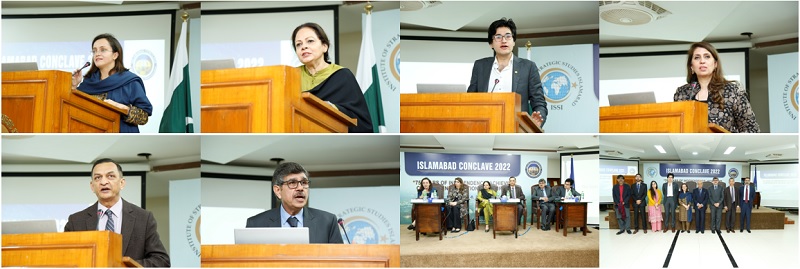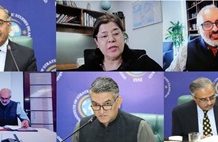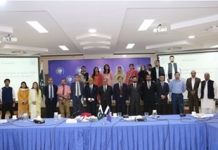Press Release
Islamabad Conclave-2022
Working Session-V: “75 Years of Independence: Pakistan’s Human and Economic Security”
December 8, 2022

The Institute of Strategic Studies, Islamabad (ISSI) held its flagship event, Islamabad Conclave 2022 on the theme “75 Years of Independence: Achieving Comprehensive National Security.” On the second day of the event, December 08, 2022, the Centre for Strategic Perspectives (CSP) hosted Session-V themed “75 Years of Independence: Pakistan’s Human and Economic Security.”
Dr. Aisha Pasha Minister of State for Finance and Revenue was the Keynote Speaker. Other panellists included Dr. Hassan Abbas, Founding Member, Zizak; Dr. Idrees Khawaja, Senior Research Economist, Pakistan Institute of Development Economics; Dr. Shabnum Sarfraz Former Member, Ministry of Planning, Development and Reforms; and Mr. Shahrukh Wani Economist, International Growth Centre, University of Oxford. The session was moderated by Dr. Neelum Nigar Director CSP.
In her opening remarks Dr. Nigar said that Pakistan is faced with multiple issues impacting its economic and human security and its important to understand the macroeconomic fundamentals in order to put forth viable policy recommendations.
While giving her keynote address, Dr. Pasha said that Economic and Human Security are linked and differentiation between the two should not be made as both impact the lives of the people. Pakistan is at a low level of human security stemming from extreme poverty, food insecurity, energy insecurity, and low levels of employment in the country. Dr Pasha further highlighted that Pakistan has a youth bulge, but has not absorbed into the productive workforce. She further added that inclusive growth is missing in Pakistan and hindering its economic development. Therefore, structural changes need to be implemented to improve national security.
Mr. Wani said that Pakistan has been unable to deliver sustained economic growth and is lagging in the region in terms of GDP growth. The biggest problem of Pakistan is its inability to export, and the increased growth is largely driven by consumption with very low levels of savings and investment. He said that Pakistan needs to disincentive capital inflow in non-tradeable sectors of the economy and improve women participation in the labour force.
In her presentation Dr. Sarfraz talked about the fact that the government needs to select which areas need more focus and put effort into its uplifting. Shortage of healthy human resource is the biggest constraint to health sector in Pakistan. She further said that demographic dividend will not be a gift for Pakistan if the youth is not provided the right opportunities. There is a need for inclusion of youth voices in policy making.
Dr. Abbas said that integration of knowledge from different fields to deal with a specific issue is more likely to produce out of the box solutions to Pakistan’s water problems. The policymakers need to learn from past experiences when dealing with environmental disasters. He also stated that climate challenges bring both threats and opportunities and Pakistan needs to be ready to take advantage of the opportunities. Indus River System has great economic potential, and the country can generate lots of revenue from it if used properly.
Dr. Khawaja was of the view that for humans to be prosperous they need to be secure. For an economy to grow it needs investment and Pakistan productivity has decreased over the years. Bureaucratic hurdles are constraining the economy along with grassroot corruption which needs to be addressed. Internet access and adult education can improve productivity in Pakistan and there is a need to build aversion to corruption in the society.
At the end of the working session, Ambassador Khalid Mahmood, Chairman BoG ISSI presented ISSI Mementos to the panellists.











